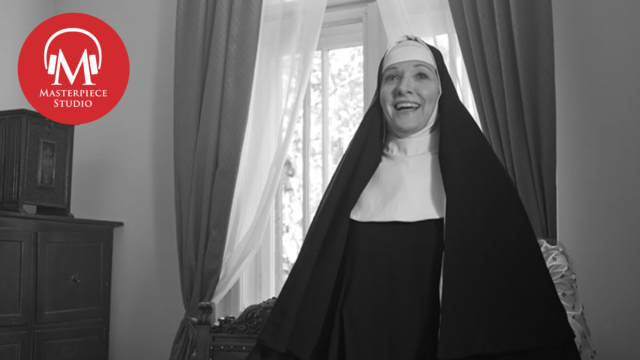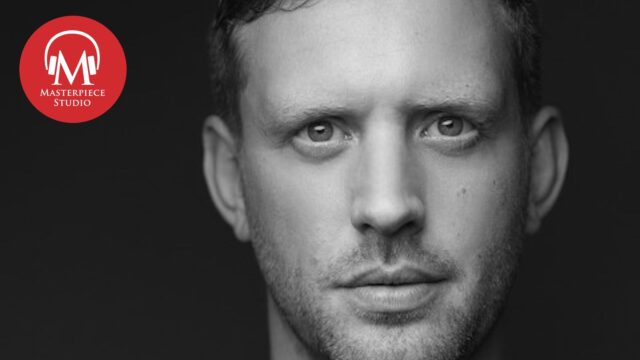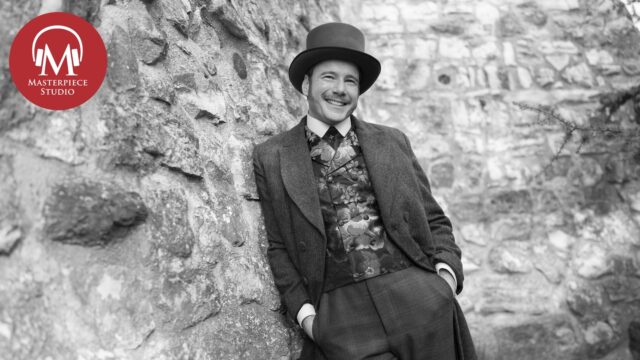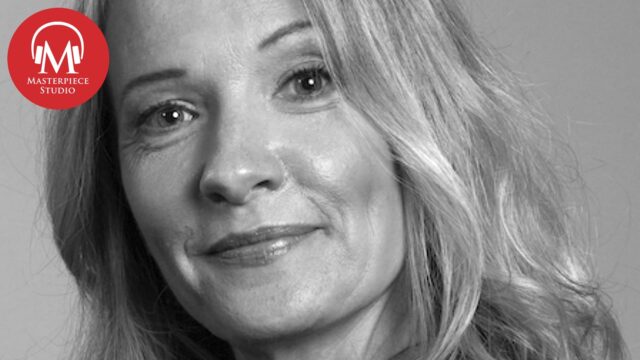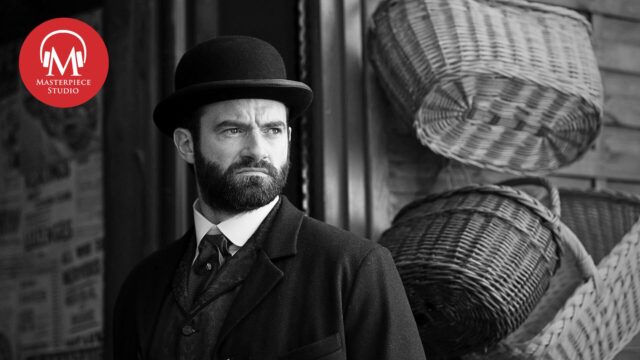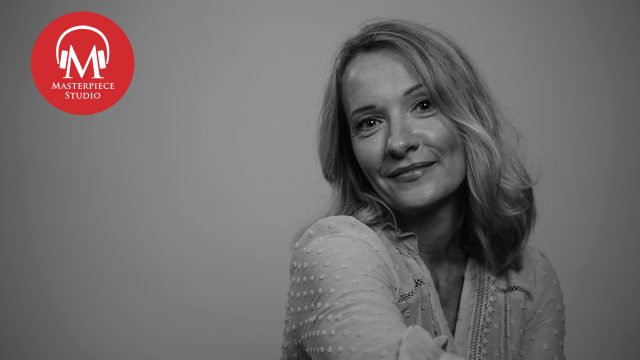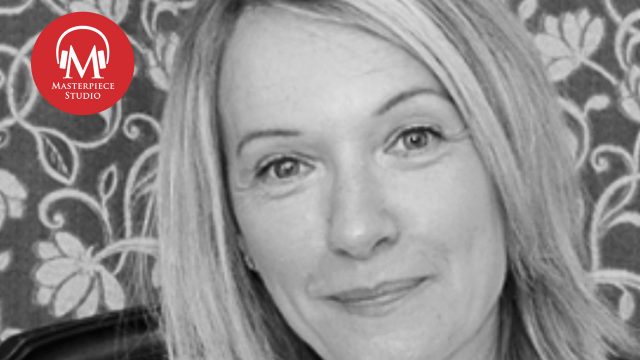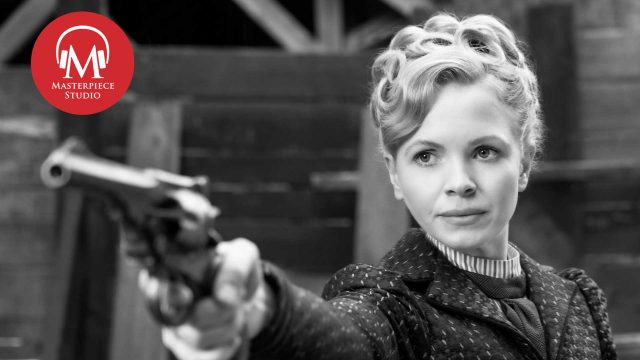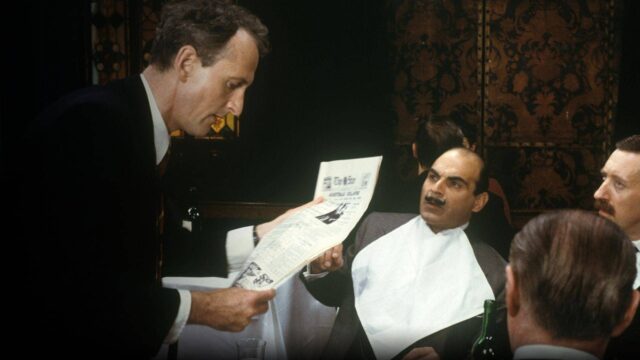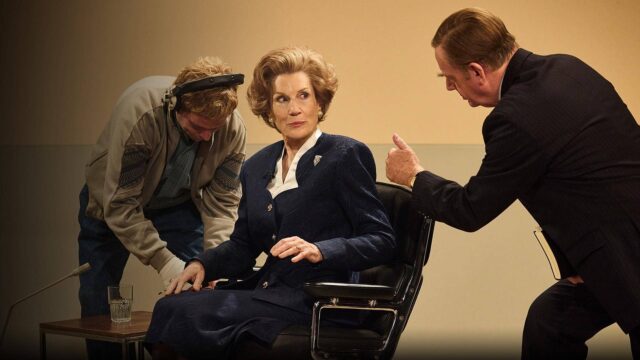This script has been lightly edited for clarity.
Jace Lacob: I’m Jace Lacob, and you’re listening to MASTERPIECE Studio.
It’s been a trying season for William Wellington, our beloved Duke. The Scotland Yard reorganization has spread his team thin. And with not enough resources to take on the extra work, the Duke and his men have no choice but to push past the point of exhaustion — a very dangerous place to be when making life-threatening decisions.
CLIP
DS Phelps: This might be the last chance we get to nab these scum Skipper.
Fitzroy: But there’s too many exits for us to cover, sir. We need more men.
Duke: We’re going in. Charlie, you go around the back. You go with them. You take the side entrance to the left. Fitzroy, you’re with me, we’ll go through the front. Remember lads, we have the advantage of surprise. So, let’s show them who they’re dealing with.
The ambush goes awry, and William is shot. While in a coma in the hospital, we flash back in time to the origin of William and Eliza’s relationship in 1860s London. And while many things have changed since then, some have not.
CLIP
Eliza: You are Scottish, whereabouts are you from?
William: Do you always ask this many questions?
Eliza: I’ll see if we have bread.
William: I heard shouting just now. He was yelling at you, wasn’t he, your pa? What did you do?
Eliza: And why do you assume it was my fault?
William: I’m right, aren’t I? What did you do?
Eliza: Do you always ask this many questions?
William eventually wakes up and begins the long road of recovery. This time away from work gives him the space to contemplate his future. And he comes to a realization that he must share with Eliza. If only he could find the right moment…
CLIP
William: I wanted to speak to you. I did attempt to this morning.
Eliza: I’m sorry you just make me nervous when you start to question me. Is it about my current investigation?
William: No, it’s about something else entirely, something I need to get off my chest. But as a man ill at ease with getting things off his chest, I thought the best thing might be to, um…
Eliza: To…?
(Knocking at the door)
Clarence: Gibson’s just sent a message. He’s meeting Lady Fallon at four o’clock.
Eliza: Well, that’s in twenty minutes.
Clarence: Mr. Nash is hailing down a cab.
Eliza: Um…
William: This can wait. You go.
Actor Stuart Martin joins us this week to explore all of these big changes for the Duke, and what his future might hold.
Jace Lacob: And this week we are joined by Miss Scarlet and the Duke star Stuart Martin. Welcome.
Stuart Martin: Hello. Thank you so much for having me back.
Jace Lacob: Thanks for coming back. At the start of series four, Eliza lacks clients, but William has more than he and his men can really handle. Scotland Yard has expanded its jurisdiction, but the Metropolitan Police Force is stretched pretty thin. So when Eliza offers to take on some cases, William quickly ushers her right out of his office. Why is he so quick to dismiss her? Why not entertain her offer here?
Stuart Martin: The lovely thing about season four for me was being able to play Duke, that he is really so under pressure in the role in Scotland Yard professionally that I think he is aware that it could really bring up more trouble than it’s worth. He has this pressure that he’s constantly had from above, and I think in this situation, he just doesn’t have the space for it. What I love is in season four, he’s really got to that place where he doesn’t have space for anything to kind of go wrong.
He’s literally spinning plates and struggling with it. Plates are falling off. We’re seeing the cracks there, I think, like we’ve never seen before. And I love that. I love being able to go full tilt into that place. So he just doesn’t have time to sort of entertain the idea that Eliza would be…you know, I think it could be more trouble than it’s worth, he thinks.
Jace Lacob: So the Duke, as you say, is under immense pressure and we can cue David Bowie “Under Pressure” right there.
Stuart Martin: Exactly. My favorite song.
Jace Lacob: Great song. Is any of that inherent tension, pushing her away from his office, is that due at all to her newly formed alliance with Nash? Has Eliza inheriting his London office shifted the dynamic between her and Wellington at all?
Stuart Martin: No, I don’t think it has. You know, I think to go back to that first question as well, one of the reasons that he isn’t so trusting of it is because actually Eliza isn’t fully telling the truth in that moment. When he comes in, she’s got this full office, and that’s not quite the truth, you know?
They’re not quite honest with each other. Or Eliza’s not quite honest with him, I think in that first episode. Whereas he’s certainly like, I’m stressed, I’m struggling. But yeah, they’re not fully open with each other like, this is where we are. We don’t try and work it out from that place, I think in episode one. So he’s kind of right to be not trusting of her. He’s got a little bit of questioning over what the intent is there.
Jace Lacob: When pursuing cases, William often has to navigate corruption, dead ends, misleading information from suspects, and even those with whom he works. And that being said, he does give in to blackmail ever so slightly in episode one with Fitzroy’s father. Is it again that intense pressure that he’s feeling? Is it just a moment of weakness for being so overworked? Or is it just from being around that sort of attitude day by day that it is sort of eroding the very foundations of his morality?
Stuart Martin: Yeah, it’s a good question. It’s funny that you’ve raised that one, actually. Because at the time, you’re going, what is the level of that morality here? And of course, there shouldn’t be a question over that. But one is that sort of institutional thing that he certainly fights against. But I think it’s one of those unfortunate things at the time. And I think were it something else, as he’s done in the past, he would kind of stand up to it. But it does erode, and I think season four for Duke, what I really loved about it is we do get to see that eroded, we do get to see him question a lot more, and we get to sort of see the outcome of that.
So I think it’s a good thing to sort of test. We really get to test it and see, well, what effect does that have on him, what effect does that have on how he sees the Metropolitan Police, what his role is within it, whether he can do anything, whether he’s okay accepting these things that he has to accept to continue to do a job. Can he still continue to do the right thing and what he believes in, or is he going to kind of become changed as a person throughout the process?
Jace Lacob: Eliza and Wellington come together at the end of episode one, and they do have this heart to heart. With the pressures of the case resolved, these two can finally interact on a more human level.
CLIP
Eliza: Things haven’t quite turned out how I’d hoped. Sometimes I do wonder…
Duke: If it’s all worth it? You are a good detective Eliza, very good. And whatever happens from here, you’ll find a way to make it work. You always do.
Jace Lacob: If these two met in another time, another place, working different jobs, or if Eliza weren’t working at all, would they still have the same chemistry? Is that similarity the thing that, while causing them friction, also gives them that spark?
Stuart Martin: That’s a great question. Yeah. I mean, what I love about these two is I think in any world, they would always find each other no matter what the background was, no matter what the situation was. Professionally, socially, I think they would always find each other. I think what’s kind of interesting is that no matter what they’re struggling with, and we see them struggling with in the show, that is kind of what’s keeping them apart, would that also keep them together?
And I think right now they see each other as a priority, but they are aware that that priority is always going to be there. So they don’t have to worry about it. It’s there. It’s always been a constant. It’s up there. I’ve never had to question it because I’ve never lost it. Since they were teenagers, they’ve always had each other. They’ve just always been in one another’s lives. So wherever they are, whatever profession and whatever was going on in their lives, I think they would always come together really.
Jace Lacob: I do like the fact that it is not just about the fact that she is a professional woman because as we saw in the last series, Arabella was also a working woman in the Victorian era. But she and William weren’t rivals or colleagues. She worked in an entirely different industry. And I think a lot of the friction comes from Eliza wanting what William has professionally, but societal circumstances precluding her from achieving those ends.
Stuart Martin: Yeah, I do think of him as a forward-thinking man of the time. And I do think that although he doesn’t maybe say it, I think with Eliza, he thinks she’s phenomenal. There’s no question over her being a woman in this world, being a woman in a professional sense in what she does. I think where he’s run into trouble is that his career, which he’s cared so much about, although there’s the positive, Eliza has this amazing effect and being able to solve these cases, it then reflects, unfortunately, because of the way society is sometimes, at that time, on him, it reflects badly on him.
It’s these superiors saying how they see it. And that, I think, is really interesting. He knows that she’s phenomenal. He would like nothing more than using her on all the cases and working with her, and she would be part of Scotland Yard. But unfortunately, that’s not the way the superiors see it, and that is what causes him problems and pressure.
Jace Lacob: Last time we spoke, you hinted we might find out more about William and Eliza’s past in Series 4, and we do with a truly fantastic flashback episode. And we see Eliza and William’s first meeting while the Duke is in a coma in the show’s present day. What did you make of that episode and how do you feel it transforms our understanding of their dynamic?
Stuart Martin: I absolutely loved it. I got to see a little bit when I was doing ADR. So I got to watch 15 minutes of it, and it’s just brilliant. I mean, first of all, the guys are amazing in it and have that real sense of the characters. I mean, they’re like, it’s so lovely to see them at that age and they do it so brilliantly.
And what I really loved about it when I first read it was, speaking of their pasts, this is a moment that we’ve talked about, or Rachael’s written about since episode five, season one. And I love the fact that we don’t have to jump into it straight away. We don’t have to talk about it too much. But the fact has now come up in a full kind of like, I see it as a little Easter egg of an episode. To get to explore and kind of deepen their world, I love. I love that in storytelling. And I love the fact that you can say so much about them now without having a scene about it.
So that episode for me, everything, the nostalgia of it almost, is so lovely. And seeing how different they are when they were younger but also the similarities and what’s not changed. The stubbornness and the banter and all that stuff is still there. So I loved that episode. I can’t wait to see the whole thing. Actually, I haven’t seen the whole thing yet.
Jace Lacob: Oh, it’s great. We see their kiss, which plays out differently to how the Duke had previously described it. He said it was chaste. We see Eliza’s fury to learn that the young William would be joining the police force. And those two things, essentially sex and work subvert Victorian norms. It’s Eliza who kisses William. It’s Eliza who wants to work for the police. In the current day, I’ll say, is William aware at all of how angry Eliza is? Is he oblivious to his male privilege here?
Stuart Martin: Yeah, it’s such an interesting question, because I think he probably is, because I think so often, people are unaware, unfortunately, day to day of their privilege, of that male privilege, or whatever kind of privilege it might be. And I think that he then is. I think he sort of understands that there is a difference.
But he hasn’t yet seen her do this kind of phenomenal journey and he shouldn’t have to be kind of proven in that. But it would be the first time I think that he’s seen that in action. And I think it’s the first time that over the course of from that episode to the present day, that he’s very quickly kind of changed and, oh wow, which unfortunately a lot of the rest of that world or the rest of the world at the time isn’t.
MIDROLL
Jace Lacob: So, episode four begins, William is convalescing at Eliza’s house and Ivy’s fussing over him. He worries he’s going to grow fat from too much breakfast, not enough exercise. And then without even realizing it, he and Eliza are touching each other’s hands. It’s really intimate and unexpected. How did you read that moment of physical contact between them?
Stuart Martin: So, for me, season four was to not be coy about it as Duke, to wherever it allowed, was to go, this is my intention, this is where I’m at. And I’m looking for the right moment, or I’m certainly not shying away from the moments where it kind of comes up.
So, I think before, if that moment had happened, he would have made a bit of an excuse as it wasn’t the right thing and there’s a lifelong friendship there. And I think he probably would have shied away from it or made a joke. But I feel like now he sits in a place where it’s like, okay, which I loved about season four, I think it was to try and follow that line of this is what I want now, it’s about how do I play that.
Jace Lacob: And I do think that brush with death, that does change a person profoundly. The William before, I don’t think would ever say he’s considering not returning to work, that there are other things in life to consider, such as the future. We have that scene of them in the kitchen.
CLIP
William: You know, this has made me realize that there are other things in life to consider.
Eliza: Such as?
William: The future.
Eliza: Your future is at Scotland Yard. I don’t think that’s ever been in question.
William: I’m not talking about work. You know, the first time we met was in this kitchen.
Eliza: It was. I remember watching you eat. What was it, pork pie?
William: Smoked ham. I can still remember the look of horror on your face.
Eliza: It wasn’t horror, it was fascination. I’d never seen anyone eat like that. I still haven’t.
Jace Lacob: This scene, this really, really tender reminiscence of their first meeting and the smoked ham and all of those things, I think probably would have played out differently had he not been injured. And I wonder, would this have happened at all? Would he be able to be this emotionally honest or vulnerable had he not maybe reconfigured those priorities?
Stuart Martin: Totally. Yeah, I mean, completely. I was watching it the other day going, Oh God, you know, he is struggling and for a man of that time, he has been struggling for a long time because we see these pressures. And reading it, episode four, I was like, wow, he’s so vulnerable and he’s got a sling on and he’s not in his normal get up. When you first read it, you go, God, this is such a different character. It’s so different. It’s so out of character for him. His status is kind of, his work status, his detective status and all that status that he has from being in his job and being good at his job is kind of gone.
So when I was navigating it and looking at it, I was going, alright, I’ve got to have an eye on that. And then the really lovely thing was to go, actually, that is the beauty of it, is his kind of vulnerability. Certainly, he’s going, this is where I am at. Everything that I’ve worked for and everything that we’ve ever seen in this show, I’m sort of saying maybe I don’t believe in that anymore. Maybe there’s something bigger, which I’m so surprised to kind of see him at. So, I loved that. It was a great thing to shift it. But it took me a little moment to shift into that and go, oh no, this is the truth of it. We just haven’t seen him like this before.
Jace Lacob: Ivy rather frankly tells him he should declare his love to Eliza, but Eliza’s work sort of gets in the way of that proclamation. And we have this almost kind of French farce situation where he keeps trying to tell her and he can’t. Other things intrude. But what spurs him then to sort of sit down and write the letter, capital T, capital L, The Letter?
Stuart Martin: Yes, that letter. I have to say again, I love how Rachel and Ben write that stuff. This is what we want to happen. And I think so often you as a character end up saying it. And I think with the scene with Arabella, where actually it was someone else that said it and the same here with Ivy, someone else kind of saying it, it’s so genius when you read it, you just go, brilliant! I just love it. It’s kind of just holding it back. And then we see later in episode four, even when he writes it.
And then we don’t until that later scene, see him kind of saying it. And then it’s got such power, but it just feels very Duke. I think it’s genius. And I love it when I read it. And I love it when I see it where it’s just that subtlety and brilliance of her writing.
Jace Lacob: So he writes the letter, but before he can then give her the letter, work intrudes once more, of course. And he’s about to leave the letter on her desk when he sees it, “Eliza Scarlet, Chief Investigator”. What goes through William’s head here in this moment? What happens?
Stuart Martin: Yeah, brilliant. I think, he says, I find it hard to sort of say what I feel or whatever, and I sort of feel like actually he’s pretty good at it. And I think in other romantic situations leading up to this, he’s been pretty good at it. But I think he’s never obviously felt like how he has for Eliza. And there’s so much pressure and fear on that, and messing it up, and also a kind of knowledge that she needs him, but he’s not everything.
She has other stuff. She has the other things that she cares about and loves. And I think he knows that. Where I think maybe before, he’s probably had it where people expected more of him, or hung on him a little bit. And I really like the romance to the letter, but I also think that there’s a, just a way of, I don’t quite know how I’m going to be able to say everything that I need to say.
So when he first sits down to write that letter, he’s almost going to write a page long, who knows, it might be three pages, almost like a text message that says, listen, I’m just painting it out for you here because I know we’ve done this and I know we’ve been here and I know we’ve, you know, that thing of this massive, factual letter. But then, very quickly, he realizes that you’ve just got to speak your heart. And it’s very simple, and he hasn’t actually said it to her before. It’s been in his head for a long time, and what speaks honesty and truth and love like just saying those words. So, I love that.
Jace Lacob: No emojis. He doesn’t even use emojis.
Stuart Martin: No emojis.
Jace Lacob: But then we get that final scene, which is beautifully heartbreaking.
CLIP
Eliza: Where are you going? You’re not well enough to go home yet.
William: I’m not going home. I’ve been to see the super and he has agreed I’m going to New York. Taking the secondment.
Eliza: For a year?
William: For a year.
Eliza: This is because I was late for dinner?
William: No. This is because I love you. It’s a rare occurrence that I cause you to be speechless. Perhaps I should tell you that I love you more often.
Eliza: Well, you love me and yet you’re leaving?
William: Something has to change Eliza. Perhaps for you, perhaps for me. But this will give us the time to consider our options.
Eliza: I don’t understand.
William: Yes, you do. If we are to be together, then I cannot remain at Scotland Yard with you a private detective. Nor can I be around you anymore without being with you.
Jace Lacob: Why does he feel this is the only course of action available to him at this point?
Stuart Martin: I think to him, in the Duke’s head, she’s kind of unavailable and that’s not in a negative way, but she is so busy and I think he wants to be needed or he wants to be wanted. As anyone of any sex, we want to be in a relationship where there’s a balance there. And I think right now in that place, he is kind of ready to make changes. He is. And leading up to that scene in four, he’s really slowed down after his injury. He is relooking at things.
And I think maybe were she to ask him to stay, maybe if there was a conversation about compromise, what’s interesting is he just goes, right, this is what I’m doing. He’s made a decision and there’s not a finality to that. It’s a year and he’s only across the pond. You know, it’s only a 12-week boat ride or whatever. It makes total sense to me that he rightly or wrongly, whether you think it’s crazy, whether you think it’s unfair, I think he feels like subconsciously, I’ve got a goal. I have to do this.
I think what he hopes is that it will kind of push a reaction from Eliza that will be similar to what he had when he almost lost everything where she will maybe reevaluate parts of life to go, yes, there is a place for you in it, as my love partner. You know? Although he wouldn’t say it, and he wouldn’t want her to change, don’t you ever just want that for someone to go, I want you, I need you.
Jace Lacob: And they finally kiss for the first time as adults and this time it’s William who kisses Eliza and it inverts the earlier kiss in their youth. What do you feel is contained within this kiss? What’s unspoken even as they finally kiss. Is it, “This isn’t goodbye, it’s goodbye for now,” as he says, or is it something deeper?
Stuart Martin: Oh my god. I mean, it’s everything. In that moment it is, you know, going off that train of thought before, he hopes that she would just grab him and say, let’s work this out, in whatever the Victorian version of that is, or whatever their version of that is. My God, I mean, what was interesting about that scene was we kind of started working it and I think we’ve both said before that the beauty of this and the beauty of working with Kate and the beauty of working on this show with Rachel’s writing and Ben’s writing is that you’ve obviously learned your lines and you’ve done your work. You step on set and we’re doing a line run and it just kind of goes.
And we’re into it by the time we get to the end of that line run. And you’re going, ah, yeah, it just works. We know what it is. Normally you’re trying to work it out. You’re trying to go, oh, should I sit there, on other kinds of shows. But with this, it’s always been, boom, oh. It’s very intuitive.
And with a couple of scenes, you’re always kind of going, maybe there’s a nervousness there about how you play it out. And I think with this scene, I certainly came in playing all my emotions with that moment and playing into the emotion of it. In fact it was Rachel I think, who came in and said, you’ve reached this place, so you have to play it from that place, which is, you’ve resigned to that fact before the scene. And I felt, God, this is a bit brutal. I’m being a little bit brutal here. But I think it plays in a much more realistic, heartbreaking way, rather than him playing into the melodrama of him saying, I’m going. So I really loved that note.
But when there’s that kiss, he’s fighting saying everything that he’s saying. I think that’s my point, that he’s really holding everything inside. The way that he says, I love you, and the way that she’s sort of, we’re kind of with her, you know, holding back in that moment because if he didn’t hold back, it would all flood out, you know? And I think they both recognize that maybe in this moment, this is for the best.
Jace Lacob: So, William is off to America, leaving a bereft Eliza to pick up the pieces. How do you think Eliza will handle Wellington’s departure? Will she rise to the occasion and perhaps embrace her newfound independence?
Stuart Martin: Yeah, I mean, she’s always had complete independence anyway. There’s no necessity in her life for William on a kind of professional front or any of that, but there was a love for him and is a love for him. So, to remove that from such an important part of her life and prominent part of her life, I mean, look, she’s going to continue to absolutely smash it.
It’s interesting, I don’t know how they’ll both handle it. I feel like, are they just going to kind of cope? Are they just going to do the things which I think that they can both do? The hope is that they don’t both just kind of go, this is the way it is, this is hard. And that they see, which is the intention really, see that challenge and that mix up and that change in the status quo that they’ve had, to kind of fight back for it. You want them to fight for each other really. And that’s kind of the point of it is, we’ve got into a place where we’ve been in this place for a while and it keeps creeping, but we need to shake things up. There needs to be a shake up because we need to be pushed.
I mean, he almost dies in episode two, and you know nothing quite changes. That’s interesting. So if nothing quite changes there, what do we need to do? So it’s kind of a, I don’t want to say a challenge, but it is, he’s kind of going, well, let’s challenge it. And if it’s not going to happen, it’s not going to happen. But I think he had to challenge it and question it. So she’s going to be absolutely fine. But I also kind of hope that she fights for him.
Jace Lacob: Well, we’ll see. Stuart Martin, thank you so very much.
Stuart Martin: Thank you so much, Jace.
Next time, we travel back to the Yorkshire Dales where young vet-in-training Richard Carmody gets some hands-on experience with a difficult, yet necessary part of the job.
CLIP
(gears grinding)
Richard: Argh!
James: The clutch, the clutch! Richard.
Richard: I am disengaging the transmission.
James: No, the other foot.
Richard: Argh!
James: Just take your time.
Join us next week as we chat with actor James Anthony-Rose about how his character, the brilliant but very green Richard Carmody, is adjusting to country life in the Dales.












